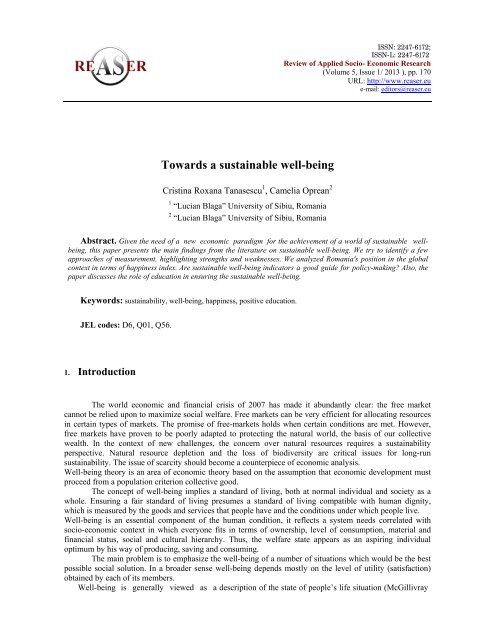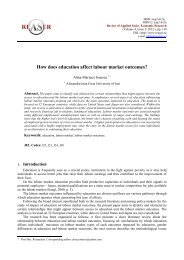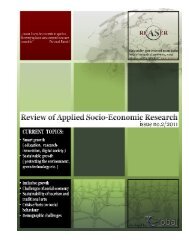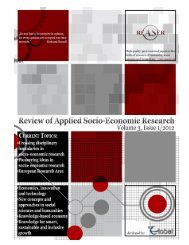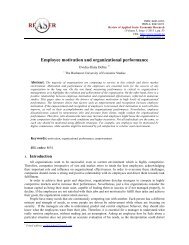new characteristics of inequalities in the information society and ...
new characteristics of inequalities in the information society and ...
new characteristics of inequalities in the information society and ...
You also want an ePaper? Increase the reach of your titles
YUMPU automatically turns print PDFs into web optimized ePapers that Google loves.
ISSN: 2247-6172;<br />
ISSN-L: 2247-6172<br />
Review <strong>of</strong> Applied Socio- Economic Research<br />
(Volume 5, Issue 1/ 2013 ), pp. 170<br />
URL: http://www.reaser.eu<br />
e-mail: editors@reaser.eu<br />
Towards a susta<strong>in</strong>able well-be<strong>in</strong>g<br />
Crist<strong>in</strong>a Roxana Tanasescu 1 , Camelia Oprean 2<br />
1 “Lucian Blaga” University <strong>of</strong> Sibiu, Romania<br />
2 “Lucian Blaga” University <strong>of</strong> Sibiu, Romania<br />
Abstract. Given <strong>the</strong> need <strong>of</strong> a <strong>new</strong> economic paradigm for <strong>the</strong> achievement <strong>of</strong> a world <strong>of</strong> susta<strong>in</strong>able wellbe<strong>in</strong>g,<br />
this paper presents <strong>the</strong> ma<strong>in</strong> f<strong>in</strong>d<strong>in</strong>gs from <strong>the</strong> literature on susta<strong>in</strong>able well-be<strong>in</strong>g. We try to identify a few<br />
approaches <strong>of</strong> measurement, highlight<strong>in</strong>g strengths <strong>and</strong> weaknesses. We analyzed Romania's position <strong>in</strong> <strong>the</strong> global<br />
context <strong>in</strong> terms <strong>of</strong> happ<strong>in</strong>ess <strong>in</strong>dex. Are susta<strong>in</strong>able well-be<strong>in</strong>g <strong>in</strong>dicators a good guide for policy-mak<strong>in</strong>g? Also, <strong>the</strong><br />
paper discusses <strong>the</strong> role <strong>of</strong> education <strong>in</strong> ensur<strong>in</strong>g <strong>the</strong> susta<strong>in</strong>able well-be<strong>in</strong>g.<br />
Keywords: susta<strong>in</strong>ability, well-be<strong>in</strong>g, happ<strong>in</strong>ess, positive education.<br />
JEL codes: D6, Q01, Q56.<br />
1. Introduction<br />
The world economic <strong>and</strong> f<strong>in</strong>ancial crisis <strong>of</strong> 2007 has made it abundantly clear: <strong>the</strong> free market<br />
cannot be relied upon to maximize social welfare. Free markets can be very efficient for allocat<strong>in</strong>g resources<br />
<strong>in</strong> certa<strong>in</strong> types <strong>of</strong> markets. The promise <strong>of</strong> free-markets holds when certa<strong>in</strong> conditions are met. However,<br />
free markets have proven to be poorly adapted to protect<strong>in</strong>g <strong>the</strong> natural world, <strong>the</strong> basis <strong>of</strong> our collective<br />
wealth. In <strong>the</strong> context <strong>of</strong> <strong>new</strong> challenges, <strong>the</strong> concern over natural resources requires a susta<strong>in</strong>ability<br />
perspective. Natural resource depletion <strong>and</strong> <strong>the</strong> loss <strong>of</strong> biodiversity are critical issues for long-run<br />
susta<strong>in</strong>ability. The issue <strong>of</strong> scarcity should become a counterpiece <strong>of</strong> economic analysis.<br />
Well-be<strong>in</strong>g <strong>the</strong>ory is an area <strong>of</strong> economic <strong>the</strong>ory based on <strong>the</strong> assumption that economic development must<br />
proceed from a population criterion collective good.<br />
The concept <strong>of</strong> well-be<strong>in</strong>g implies a st<strong>and</strong>ard <strong>of</strong> liv<strong>in</strong>g, both at normal <strong>in</strong>dividual <strong>and</strong> <strong>society</strong> as a<br />
whole. Ensur<strong>in</strong>g a fair st<strong>and</strong>ard <strong>of</strong> liv<strong>in</strong>g presumes a st<strong>and</strong>ard <strong>of</strong> liv<strong>in</strong>g compatible with human dignity,<br />
which is measured by <strong>the</strong> goods <strong>and</strong> services that people have <strong>and</strong> <strong>the</strong> conditions under which people live.<br />
Well-be<strong>in</strong>g is an essential component <strong>of</strong> <strong>the</strong> human condition, it reflects a system needs correlated with<br />
socio-economic context <strong>in</strong> which everyone fits <strong>in</strong> terms <strong>of</strong> ownership, level <strong>of</strong> consumption, material <strong>and</strong><br />
f<strong>in</strong>ancial status, social <strong>and</strong> cultural hierarchy. Thus, <strong>the</strong> welfare state appears as an aspir<strong>in</strong>g <strong>in</strong>dividual<br />
optimum by his way <strong>of</strong> produc<strong>in</strong>g, sav<strong>in</strong>g <strong>and</strong> consum<strong>in</strong>g.<br />
The ma<strong>in</strong> problem is to emphasize <strong>the</strong> well-be<strong>in</strong>g <strong>of</strong> a number <strong>of</strong> situations which would be <strong>the</strong> best<br />
possible social solution. In a broader sense well-be<strong>in</strong>g depends mostly on <strong>the</strong> level <strong>of</strong> utility (satisfaction)<br />
obta<strong>in</strong>ed by each <strong>of</strong> its members.<br />
Well-be<strong>in</strong>g is generally viewed as a description <strong>of</strong> <strong>the</strong> state <strong>of</strong> people’s life situation (McGillivray


